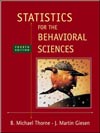 |  Statistics for the Behavioral Sciences, 4/e Michael Thorne,
Mississippi State University -- Mississippi State
Martin Giesen,
Mississippi State University -- Mississippi State
Confidence Intervals and Hypothesis Testing
Problems- Find
 <a onClick="window.open('/olcweb/cgi/pluginpop.cgi?it=gif:: ::/sites/dl/free/0072832517/55318/9a.GIF','popWin', 'width=NaN,height=NaN,resizable,scrollbars');" href="#"><img valign="absmiddle" height="16" width="16" border="0" src="/olcweb/styles/shared/linkicons/image.gif"> (0.0K)</a> for each of the following samples. <a onClick="window.open('/olcweb/cgi/pluginpop.cgi?it=gif:: ::/sites/dl/free/0072832517/55318/9a.GIF','popWin', 'width=NaN,height=NaN,resizable,scrollbars');" href="#"><img valign="absmiddle" height="16" width="16" border="0" src="/olcweb/styles/shared/linkicons/image.gif"> (0.0K)</a> for each of the following samples.
- N = 37, s = 5.3
- N = 10, s = 2.5
- N = 93, ∑ X = 1,032.3, ∑ X2 = 12,801.45
- df = 27, s2 = 201.64
- N = 25, s = 10.75
- Use Table B to answer the following questions.
- If N = 10, what t scores cut off the deviant 5% of the distribution?
- If df = ∞, what t scores cut off the deviant 1% and 5% of the distribution? Are they similar to the z scores cutting off 1% and 5%? Explain.
- For N = 47, what t scores cut off the deviant 5% and 1% of the distribution?
- Why do the critical values of t decrease with increases in df?
- According to the text, what critical values of t do you use when the exact df observed are not given in the table?
- Find the 95% and the 99% confidence intervals for each of the following data sets.
- N = 257, ∑ X = 5,140, ∑ X2 = 106,912
- N = 26, X = 10, s = 2
- N = 42, ∑ X = 441, ∑ X2 = 4,914.42
- As part of its hiring procedure, a large company administers a standardized personality scale to job applicants. Fifty-four applicants for a quality control position have a mean score of 54.2, with s = 16.1, on the dimension of Conscientiousness. Assume that µ for Conscientiousness is 49.8.
- Determine whether applicants for the quality control position demonstrate higher Conscientiousness scores than the general population.
- Based on this sample of applicants, what is the 95% confidence interval for µ?
- What is the 99% confidence interval for µ?
- A sample of 49 participants works at a perceptual task on which they have to correctly identify the shape of a stimulus after exposures of short duration. The number of correct identifications on 50 trials is recorded and the average is found to be 29.6, with s = 7.3.
- Construct the 95% confidence interval for µ.
- Construct the 99% confidence interval for µ.
- Assume that the 327 students who have taken statistics at a large university constitute a population. Each student has been given a math achievement test with the following results: µ = 53.7, σ = 10.5. On the basis of this information, answer the following questions.
- What is the standard error of the mean for samples of size N = 25?
- One sample of 25 students has been drawn from the population, and the average test score has been found to be 55.1, with s = 8.5. What is the estimated standard error?
- Test the null hypothesis using the sample described in part b.
- It is possible that you made an error in your decision in part c. If so, would it be a Type I or a Type II error?
- The average rested worker at a calculator production plant can assemble 106 pocket calculators an hour. During the last hour of their shift, 26 workers assemble an average of 97.4 calculators, with s = 17.2. Is the performance of these workers significantly worse at the end of the shift?
- In 20 years of coaching basketball, Coach Williams has kept records of her teams' performance making free throws during games. Her records indicate that the average player makes 71.1 shots out of 100. Not satisfied with that performance, Coach Williams hires a sports psychologist to work with the team to improve concentration and visualization at the foul line. At the end of the year, Coach Williams discovers that the 12 players on her team averaged 77.6 successful free throws per 100 attempts, with s = 8.41.
- What is
 <a onClick="window.open('/olcweb/cgi/pluginpop.cgi?it=gif:: ::/sites/dl/free/0072832517/55318/9a.GIF','popWin', 'width=NaN,height=NaN,resizable,scrollbars');" href="#"><img valign="absmiddle" height="16" width="16" border="0" src="/olcweb/styles/shared/linkicons/image.gif"> (0.0K)</a> for the sample? <a onClick="window.open('/olcweb/cgi/pluginpop.cgi?it=gif:: ::/sites/dl/free/0072832517/55318/9a.GIF','popWin', 'width=NaN,height=NaN,resizable,scrollbars');" href="#"><img valign="absmiddle" height="16" width="16" border="0" src="/olcweb/styles/shared/linkicons/image.gif"> (0.0K)</a> for the sample? - Find the 95% confidence interval. Is 71.1 within the interval?
- Test the hypothesis that µ = 71.1.
- Did working with the psychologist significantly improve free-throw shooting?
- At a large high school, 537 seniors take the ACT with the following results: µ = 22.5, σ = 4.1. Assuming that the 537 seniors constitute a population, answer the following questions.
- Suppose that 50 samples of size N = 10 have been drawn with replacement from the population. The mean of the resulting sampling distribution is found to be 22.73, with s = 4.05. What is
 <a onClick="window.open('/olcweb/cgi/pluginpop.cgi?it=gif:: ::/sites/dl/free/0072832517/55318/9a.GIF','popWin', 'width=NaN,height=NaN,resizable,scrollbars');" href="#"><img valign="absmiddle" height="16" width="16" border="0" src="/olcweb/styles/shared/linkicons/image.gif"> (0.0K)</a> for this sampling distribution? <a onClick="window.open('/olcweb/cgi/pluginpop.cgi?it=gif:: ::/sites/dl/free/0072832517/55318/9a.GIF','popWin', 'width=NaN,height=NaN,resizable,scrollbars');" href="#"><img valign="absmiddle" height="16" width="16" border="0" src="/olcweb/styles/shared/linkicons/image.gif"> (0.0K)</a> for this sampling distribution? - What is
 <a onClick="window.open('/olcweb/cgi/pluginpop.cgi?it=gif:: ::/sites/dl/free/0072832517/55318/9a.GIF','popWin', 'width=NaN,height=NaN,resizable,scrollbars');" href="#"><img valign="absmiddle" height="16" width="16" border="0" src="/olcweb/styles/shared/linkicons/image.gif"> (0.0K)</a> ? How does it compare with <a onClick="window.open('/olcweb/cgi/pluginpop.cgi?it=gif:: ::/sites/dl/free/0072832517/55318/9a.GIF','popWin', 'width=NaN,height=NaN,resizable,scrollbars');" href="#"><img valign="absmiddle" height="16" width="16" border="0" src="/olcweb/styles/shared/linkicons/image.gif"> (0.0K)</a> ? How does it compare with  <a onClick="window.open('/olcweb/cgi/pluginpop.cgi?it=gif:: ::/sites/dl/free/0072832517/55318/9a.GIF','popWin', 'width=NaN,height=NaN,resizable,scrollbars');" href="#"><img valign="absmiddle" height="16" width="16" border="0" src="/olcweb/styles/shared/linkicons/image.gif"> (0.0K)</a> computed in part a? <a onClick="window.open('/olcweb/cgi/pluginpop.cgi?it=gif:: ::/sites/dl/free/0072832517/55318/9a.GIF','popWin', 'width=NaN,height=NaN,resizable,scrollbars');" href="#"><img valign="absmiddle" height="16" width="16" border="0" src="/olcweb/styles/shared/linkicons/image.gif"> (0.0K)</a> computed in part a? - Suppose we draw another sample of size N = 10 from the population and find its mean to be 20.85, with s = 3.73. Test the hypothesis that this sample was drawn from the original population with µ = 22.5.
- What is the 95% confidence interval for µ based on the sample in part c?
 Click here to view the answers (11.0K) Click here to view the answers (11.0K) |
|



 2003 McGraw-Hill Higher Education
2003 McGraw-Hill Higher Education